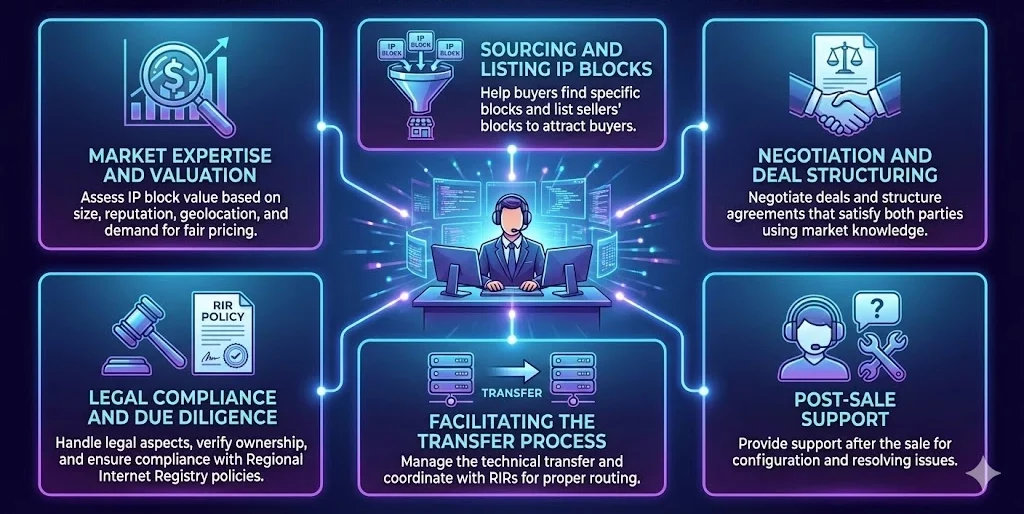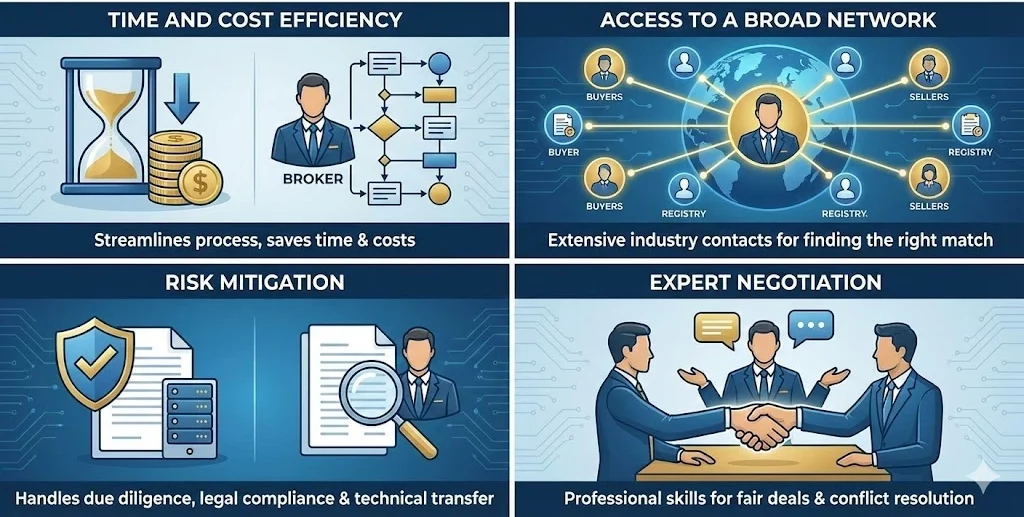The Role of IP Address Brokers in the Digital Economy

As the digital economy expands, businesses and service providers require more IP addresses to support their operations. However, acquiring these valuable resources isn’t as straightforward as it may seem. This is where IP address brokers play a crucial role, acting as intermediaries who facilitate transactions, ensure legal compliance, and provide expert guidance.
Table of Contents
In this article, we’ll explore the role of IP address brokers in the digital economy and how they bring value to buyers and sellers.
Understanding the IP Address Market

IP addresses are unique numerical identifiers that allow devices to communicate over the internet. As the internet has grown, the supply of available IP addresses, particularly IPv4 addresses, has diminished. This scarcity has led to a thriving secondary market where IP addresses are bought, sold, and leased. However, navigating this market can be complex due to the various legal, technical, and financial factors involved.
What is an IP Address Broker?
An IP address broker is a professional intermediary specializing in facilitating the purchase, sale, and transfer of IP address blocks. Brokers typically have deep knowledge of the IP address market, including current pricing trends, regulatory requirements, and the technical aspects of IP address allocation.
How IP Address Brokers Facilitate Transactions

Market Expertise and Valuation: IP address brokers have deep market knowledge, enabling them to accurately assess IP block value based on size, reputation, geolocation, and demand, ensuring fair pricing for both buyers and sellers.
Sourcing and Listing IP Blocks: Brokers help buyers find IP blocks that meet specific needs, such as clean or region-specific addresses. They also list sellers’ IP blocks, attracting a wide range of potential buyers for competitive sales.
Negotiation and Deal Structuring: Brokers negotiate deals that satisfy both parties, leveraging their understanding of market dynamics to ensure smooth transactions.
Legal Compliance and Due Diligence: Brokers handle legal aspects, including ownership verification and compliance with RIR policies, reducing the risk of disputes.
Facilitating the Transfer Process: Brokers manage the technical transfer of IP addresses, coordinating with RIRs, and ensuring proper routing.
Post-Sale Support: Brokers often provide support after the sale, helping with IP address configuration and resolving any post-transfer issues.
Value of IP Address Brokers

Time and Cost Efficiency: Navigating the IP address market can be time-consuming and complex, especially for those unfamiliar with the intricacies of IP address transactions. Brokers streamline the process, saving time and reducing the potential for costly mistakes.
Access to a Broad Network: Brokers typically have extensive networks of contacts within the industry, including other brokers, buyers, sellers, and registries. This network provides access to a larger pool of potential buyers and sellers, increasing the chances of finding the right match.
Risk Mitigation: By handling due diligence, legal compliance, and technical aspects of the transfer, brokers significantly reduce the risks associated with IP address transactions. This includes avoiding fraud, ensuring proper ownership transfer, and mitigating the risk of acquiring blacklisted or compromised IP blocks.
Expert Negotiation: Brokers bring professional negotiation skills to the table, ensuring that both parties achieve a fair deal. Their ability to mediate and resolve conflicts can prevent deals from falling apart, which is particularly valuable in high-stakes transactions.
Conclusion
IP address brokers provide the expertise, market knowledge, and negotiation skills necessary to facilitate successful IP address transactions. Whether you are a business looking to expand your IP address holdings or a seller aiming to liquidate assets, partnering with a reputable IP address broker can provide significant value, ensuring a smooth and profitable transaction.
As the demand for IP addresses continues to grow, the role of brokers will only become more critical in helping businesses navigate this essential aspect of the digital landscape.
Trusted IPv4 Leasing for Business Growth
Get enterprise-grade IPv4 space quickly, with seamless deployment and end-to-end management.
Get Started with i.leaseFAQs
How much do IP address brokers charge for their services?
Most IP brokers work on a commission basis, typically charging a “Success Fee” ranging from 15% to 35% of the total transaction value. Some may also offer flat-fee structures for smaller block transfers. It is important to clarify if this fee is paid by the buyer, the seller, or split between both parties before signing a contract.
Is it legal to buy and sell IP addresses?
Technically, you are not “buying” the IP addresses themselves but rather transferring the “Right of Registration” to use them. This process is fully legal and recognized by Regional Internet Registries (RIRs) like ARIN, RIPE, and APNIC, provided that their specific transfer policies are followed.
What are the risks of buying IP addresses without a broker?
conducting a private sale without a broker exposes you to significant risks, including:
- Fraud: Sending money and never receiving the IPs.
- Blacklisted IPs: Acquiring addresses that have been used for spam and are blocked by major networks.
- Reclamation: Buying IPs that have a “dirty” chain of custody, leading to the RIR revoking them later.
- Hidden Costs: Unexpected transfer fees or legal hurdles.
Can an IP broker help me sell my unused IPv4 blocks?
Yes. Brokers are essential for sellers because they can:
- Clean your IPs: Help remove old blacklist records to increase value.
- Find Buyers: distinct access to a global network of pre-vetted buyers.
- Handle Escrow: Ensure you get paid before the IPs are transferred out of your account.
Related Posts

Common Myths About Selling IP Addresses
The IPv4 secondary market is often shrouded in mystery, leading many organizations to sit on valuable digital assets because they fear the perceived complexity or legal “gray areas.” As IPv4 exhaustion becomes a permanent reality, the value of these addresses has skyrocketed, yet misconceptions continue to stall potential transactions. At i.lease, powered by the real-world expertise of LARUS, we’ve seen how these myths prevent companies from unlocking significant capital.Read more Related Posts Common Myths About Selling IP Addresses The IPv4 secondary market is often shrouded in mystery, leading many organizations to sit on valuable digital assets because they Read more How to buy IPv4 addresses through a certified IP broker Buying IPv4 space requires policy compliance, verified need, and registry approval, making certified IP brokers essential guides through complex global Read more What happens when IP resources are mismanaged Poor IP resource management can lead to outages, security breaches, blacklisting, legal exposure and reputational damage across networks and business Read more .related-post {} .related-post .post-list { text-align: left; } .related-post .post-list .item { margin: 5px; padding: 10px; } .related-post .headline { font-size: 18px !important; color: #999999 !important; } .related-post .post-list .item .post_thumb { max-height: 220px; margin: 10px 0px; padding: 0px; display: block; } .related-post .post-list .item .post_title { font-size: 16px; color: #3f3f3f; margin: 10px 0px; padding: 0px; display: block; text-decoration: none; } .related-post .post-list .item .post_excerpt { font-size: 13px; color: #3f3f3f; margin: 10px 0px; padding: 0px; display: block; text-decoration: none; } @media only screen and (min-width: 1024px) { .related-post .post-list .item { width: 30%; } } @media only screen and (min-width: 768px) and (max-width: 1023px) { .related-post .post-list .item { width: 90%; } } @media only screen and (min-width: 0px) and (max-width: 767px) { .related-post .post-list .item { width: 90%; } }

How to buy IPv4 addresses through a certified IP broker
Buying IPv4 space requires policy compliance, verified need, and registry approval, making certified IP brokers essential guides through complex global transfers. IPv4 transactions are regulated transfers, not simple purchases — registries must approve documentation, justification and registration changes. Certified brokers reduce risk and delay by aligning buyers with registry policy, routing legitimacy and cross-region requirements. Why companies still need to buy IPv4 addresses The global supply of IPv4 addressesRead more Related Posts Common Myths About Selling IP Addresses The IPv4 secondary market is often shrouded in mystery, leading many organizations to sit on valuable digital assets because they Read more How to buy IPv4 addresses through a certified IP broker Buying IPv4 space requires policy compliance, verified need, and registry approval, making certified IP brokers essential guides through complex global Read more What happens when IP resources are mismanaged Poor IP resource management can lead to outages, security breaches, blacklisting, legal exposure and reputational damage across networks and business Read more .related-post {} .related-post .post-list { text-align: left; } .related-post .post-list .item { margin: 5px; padding: 10px; } .related-post .headline { font-size: 18px !important; color: #999999 !important; } .related-post .post-list .item .post_thumb { max-height: 220px; margin: 10px 0px; padding: 0px; display: block; } .related-post .post-list .item .post_title { font-size: 16px; color: #3f3f3f; margin: 10px 0px; padding: 0px; display: block; text-decoration: none; } .related-post .post-list .item .post_excerpt { font-size: 13px; color: #3f3f3f; margin: 10px 0px; padding: 0px; display: block; text-decoration: none; } @media only screen and (min-width: 1024px) { .related-post .post-list .item { width: 30%; } } @media only screen and (min-width: 768px) and (max-width: 1023px) { .related-post .post-list .item { width: 90%; } } @media only screen and (min-width: 0px) and (max-width: 767px) { .related-post .post-list .item { width: 90%; } }

How to turn idle IPv4 addresses into a recurring revenue stream with iLease
Unlock the hidden value of unused IPv4 addresses with iLease, turning dormant digital infrastructure into a recurring revenue stream while navigating market demand, compliance and risk. Leasing idle IPv4 blocks can generate steady, long-term income without relinquishing ownership. Platforms like i.lease global IPv4 marketplace make it easier to monetise addresses and manage reputation and compliance. why IPv4 addresses still matter Despite the long-anticipated exhaustion of the IPv4 address space — aRead more Related Posts Common Myths About Selling IP Addresses The IPv4 secondary market is often shrouded in mystery, leading many organizations to sit on valuable digital assets because they Read more How to buy IPv4 addresses through a certified IP broker Buying IPv4 space requires policy compliance, verified need, and registry approval, making certified IP brokers essential guides through complex global Read more What happens when IP resources are mismanaged Poor IP resource management can lead to outages, security breaches, blacklisting, legal exposure and reputational damage across networks and business Read more .related-post {} .related-post .post-list { text-align: left; } .related-post .post-list .item { margin: 5px; padding: 10px; } .related-post .headline { font-size: 18px !important; color: #999999 !important; } .related-post .post-list .item .post_thumb { max-height: 220px; margin: 10px 0px; padding: 0px; display: block; } .related-post .post-list .item .post_title { font-size: 16px; color: #3f3f3f; margin: 10px 0px; padding: 0px; display: block; text-decoration: none; } .related-post .post-list .item .post_excerpt { font-size: 13px; color: #3f3f3f; margin: 10px 0px; padding: 0px; display: block; text-decoration: none; } @media only screen and (min-width: 1024px) { .related-post .post-list .item { width: 30%; } } @media only screen and (min-width: 768px) and (max-width: 1023px) { .related-post .post-list .item { width: 90%; } } @media only screen and (min-width: 0px) and (max-width: 767px) { .related-post .post-list .item { width: 90%; } }